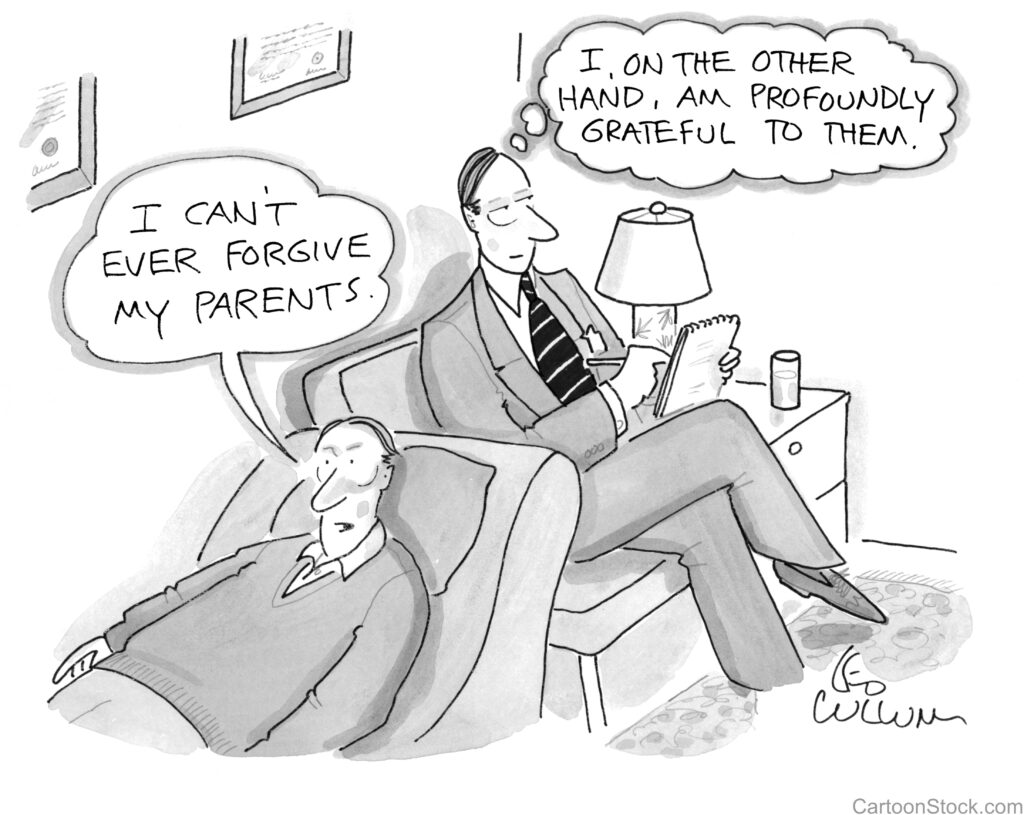
Years ago, conventional wisdom (or was it an urban legend?) taught that before you open a can of soda, tap on the top. Ostensibly, it calmed down the carbon dioxide inside the can so it wouldn’t spray when opened. So I adopted the habit of tap-tap-tapping on the lid before I pulled the tab.
One day, I saw my eight-year-old daughter tap-tap-tapping on the top of a can prior to opening it. I asked her, “Why do you tap on the lid?” She paused, and said, “Because you do, Dad.”
Oh my…
It caused me to wonder—in what other ways is she mimicking my behavior? Then I thought, for better and for worse, in what ways do I imitate my family of origin?
For instance, relative to my family of origin:
-
- Often, my father would be impatient with my mother. It saddens me to admit: I struggle with that issue in my marriage.
- My father neglected holidays and special occasions (birthdays, anniversaries). I also neglect those events.
- Mom was kind. I hope that rubbed off on me.
I recently asked my grown daughters (ages 40 and 42): “What did you ‘inherit’ from Mom and me (other than tapping on cans)?” They struggled with answering the question and Mary and I weren’t much help because we’re too close to it to be objective. Eventually, though, it led to interesting conversation.
How should we respond to these learned-from-our-family traits? How can we overcome the negative influences and strengthen the positive ones?
Mitigating the unhealthy traits is very difficult. They’re so deeply engrained we’re probably not even aware of them. It usually takes a third party’s involvement to help us identify them and change. But predisposition need not be deterministic. We can and must work through these issues.

So true. There are major issues in the fact that parents have little to no time to teach moral code due to absent parent. Not trained by a previous parent. Knowledge is not being passed down.
Sandra, I like that you highlight parents’ responsibility to teach their children moral standards, and part of that is us being candid and transparent about the mistakes we have made (and continue to make). Thanks for taking the time to write. Don
What a great idea! Not just for the sake of conversation…maybe for the sake of emotional healing…maybe for the sake of introspection (you mention that). We usually think in terms of inherited physical traits or medical issues more than habits or “quirks”. I’m going to take your lead with my adult kids and try to get both the upside and downside out of them. I think my grand kids will enter the discussion, either in person or vicariously through their parents.
Thanks, Neil. You’re right, these conversations can be healing, instructive, and insightful. Your inclusion of grandchildren adds a new dimension. Take care, Don
I suspect many parents don’t share their struggles in bringing up their children for fear of being judged. There is an African saying “It takes a whole village to raise a child.” Having grown up initially in a town in which my whole extended family lived, I can see the wisdom of this saying. My parents could take a break while aunties took us out for a day or an afternoon. We would eat regularly with our grandparents.
My mother became very anxious and depressed when we moved to a much richer area. I described it as “living up a drive behind a hedge”. They moved so that I could go to better school and I am thankful for their sacrifice.
As a parent myself, I wanted my children to live in a home where friends and family could drop by without appointments and where children could play in the street.
Angela, I love reading of the environment you grew up in…multigenerational and a smaller town. I also admire your goals as you raised your own children. Fortunately, both my girls and families live in our town and we interact often. Take care.
Thank you Don. The life lessons you share are great insight to helping me in many areas in my life.
Happy Thanksgiving
Thanks, Dennis, for kind and encouraging words. Don
Don,
In 2010 I did a talk to the Blinn Football team when Cam Newton played. I asked 3 questions which go along with this blog.
1. Why do you do what you do? (culture, parents, etc.)
2. Is what you do worth imitating?
3. Will it last? Hebrews 11:39-40 (build for coming generation)
Hi Robert, I enjoy those three questions. Number one haunts me the most. Thanks for responding.
Truer than I care to admit.
Thanks, Clyde. We all have regrets. Don
Family conversation about this sounds great; one of our kids’ families always lingers at table for conversation after a meal. Thanks for the topic idea! For myself, I think of one of our very wise daughter’s recent comments, “I think all children and parents will have to forgive each other.” (I agree, although I have nothing to forgive my children, but I have needed to forgive my mother.) Mostly, I consider the truth of Prov. 13:22 “A good man leaves an inheritance to his children’s children.” This motivates me to give thanks for my parents’ consistent good character, and also to be the godly example my children and grandchildren need. “Inheritance” includes much more than money and material goods.
Sharon, thanks for taking the time to write. I love your daughter’s comment, “I think all children and parents will have to forgive each other.”That’s refreshing and should be implemented.